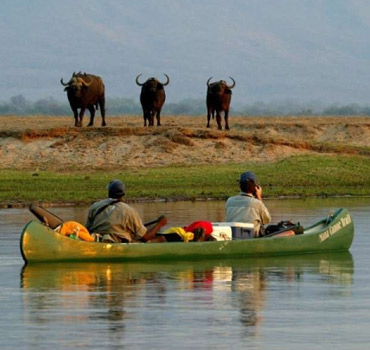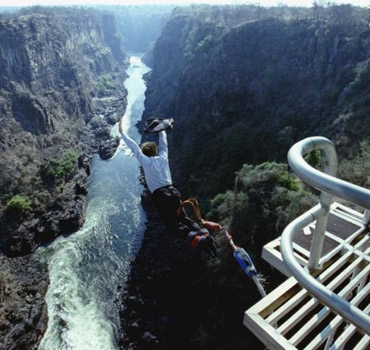World media attention focused on the new township at Kariba in the early 1960's during Operation Noah when Rupert Fothergill and his team undertook the world's biggest animal rescue attempt. An epic drama unfolded as wildlife was saved from the rising waters of the new Lake and largely relocated to Matusadona National Park and the surrounds of Lake Kariba became a fascinating turmoil of ecological change - parts of which now teem with an abundance of flora and fauna in a striking and diverse terrain.
Access by air from Harare is on Air Zimbabwe or private charter. Kariba is a 4/5 hour drive from Harare, the Zimbabwean capital. If you have your own vehicle, it's possible to connect with Victoria Falls via the ferry (22 hours – pre-booking essential) or via Zambia (the road is safe and in "reasonable" repair - don't consider with a hired vehicle); the "back" road via Binga/Magunge/Karoi is not recommended unless you're fully equipped, and the trip via Bulawayo is tarred but tedious.
A guide book has described Kariba town as an "unconsolidated two level jumble" - topographically it's very hilly, similar to parts of Matusadona and Kaburi and it doesn't have a distinguishable centre - don't expect to see a lot if you arrive without a plan or decide to give our offices a miss on the Kariba Heights!
The town is the ideal launching point into Chizarira, Matusadona, Lake Kariba, Mana Pools and the remote wilderness areas in the north and west of Zimbabwe. The middle and lower Zambezi Valley is rich in wildlife, and with its harsh terrain and climate promises first class adventures and safaris. Many of the best attractions are remote and un-commercialised - whether you have a healthy spirit of adventure or a desire for intense "relax-mode" - you ought to look at the Zambezi Valley for:
- Tented, walking and canoeing safaris
- Lodges and bushcamps
- Houseboats, cruisers and sailing adventures
- "One day" safari options, walks, canoe trips, game drives and cruises
- Fishing safaris on Lake Kariba and the lower Zambezi River
The climate is generally tropical with three reasonably distinguishable seasons - a hot rainy season from late November to March, a cool dry season from May to August and a very hot dry season from September to November. Annual rainfall ranges from 400mm (16 inches) in the Valley to about 700mm (28 inches) on the plateau. Winter temperatures rarely go below 13°C (55 degrees Fahrenheit), day time temperatures hover at about 40°C (104 degrees Fahrenheit) during the hot months.
Houseboats on Lake Kariba also make the most fantastic photographic platforms that allow for some stunning scenery shots and views of the wildlife you would not be able to get on land. Have a good look around the site and don't hesitate to contact us with any questions. We have provided some helpful information on how to choose the right houseboat below and if the particular boat that you are looking for doesn't appear on our site, don't hesitate to contact us and we will be happy to help you.
Lake Kariba is one of the largest expanses of fresh water in the world and is home to a diverse fish population.
Hiring a houseboat is a great when it comes to fishing expeditions, you have a dry, comfortable base, a tender to venture away from the boat and to fish right up by the steep shoreline of the lake. In 1955 a point on the Zambezi River known as "kariwa" (a trap) became a hive of activity with the construction of the Kariba dam wall. The wall was sealed at the end of 1958 despite the biggest flood in 1000 years delaying efforts, and repeated warnings by the local tribe that the River God, Nyaminyami had an unsettled score.






















